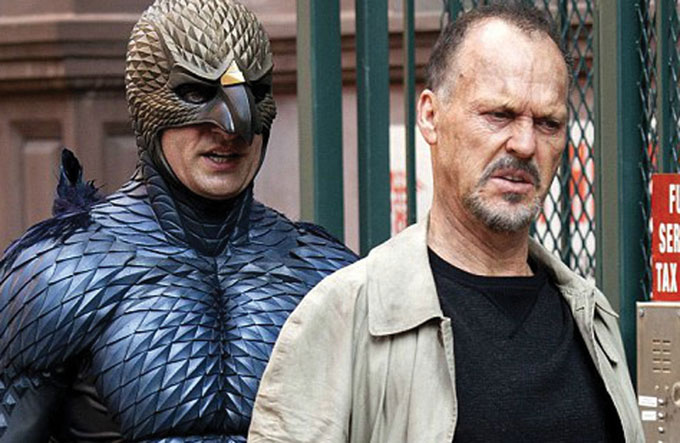Birdman
by George Sax

There’s really no getting away from Michael Keaton in Alejandro Gonzalez Iñárritu’s Birdman. Not just because he’s the star and in almost all of the movie’s scenes. It’s Keaton, not Riggan Thomson, the character he plays, who’s so deeply woven into Birdman’s fabric. Iñárritu, who wrote and directed, clearly has used the actor’s life and career as an inspiration, and an implicit backstory. They infiltrate the picture even as they’re spun out and transmuted into its increasingly wild proceedings.
Keaton, of course, was director Tim Burton’s title character in two Batman movies in the late 1980s and early 90s. The star reputedly spurned an appearance in a third, and, over the next decade or so, his stardom and marketability faded. (It didn’t help that he sometimes played hard to get.) Iñárritu’s Thomson was once the movie superhero Birdman but tired of the role and is now in need of both a comeback vehicle and artistic validation. From the way the usually unavailable Keaton has been granting interviews, he too must now feel the need for recognition and respect. (He’s recently been part of the Oscar buzz and chat.)
So Birdman’s parallelism makes it a meta movie. There are also what seem to be metaphorical allusions worked into it. It’s not out of order to ask if all this subtext and allusion isn’t too much structural complexity for one film to handle, particularly one that relies so much on changing mood and charged interpersonal encounters.
Birdman is certainly challenging, dynamic and technically fluid cinema. Keaton’s Riggan has written a stage adaptation of Raymond Carver’s short story “What We Talk About When We Talk About Love” and he’s producing and directing its Broadway premiere in a bid for that renewed attention and esteem. Things aren’t going well. One of the quartet of cast members has proved inadequate in rehearsals, and only a freak onstage accident saves the day when the actor is disabled, in a scene that’s played as comic. This opens the way for the hot-shot, ego-entitled actor-boyfriend of a cast member (Edward Norton) to step in as a replacement. As Iñárritu has written it, the role seems something of a parody of Broadway celebrity, but it also seems a little strange and old-fashioned.
It does give Keaton and Norton the opportunity for amusing and adventurous byplay and clashes. The two actors have different onscreen personas and approaches but their scenes together have a fresh, almost improvisatory feel, even as they manage to stay in character.
To a large extent though, this is Keaton’s show. He has to carry the brunt of making Birdman personally involving. Riggan’s psychology is the propulsive heart of the picture. Iñárritu’s edgy, flamboyant technique has been mustered to frame and help portray Riggan’s volatile, increasingly troubled states of mind. The long darting, tracking, single-takes of Emmanuel Lubezki’s cinematography mirror the protagonist’s spiritual conflicts and deterioration. What’s most impressive about Birdman isn’t all the technique, but Keaton’s performance in the face of the challenges. The movie charges ahead erratically, going from scenes of rather banal domestic confrontation and confession to deliberate comic excess to surreal (sometimes literal) flights. Keaton manages to keep up much of the time, without showing strain. He has always been an uncommonly adept actor who can do either manic merriment (Beetlejuice) with seeming ease, or tensely modulated work. These skills get a workout, but the movie’s not worthy of the actor.
Birdman is all too much and not enough. Iñárritu may well have been intended as a satirical take on the theatre, film and theatrical celebrity, as well as an oblique comment on the shifting relations of art and life, but the result is often and finally a little off. The results suggest Iñárritu doesn’t even think much of the theatre, or that he doesn’t know much about it. Very little is on target. One foolish scene in a Broadway bar in which a very mean New York Times critic (Lindsay Duncan) tells Riggan she’s going to ruin his play because she doesn’t like movie stars is much more silly and sour than telling. It may be instructive that what little we see and hear of Riggan’s adaptation of Carver’s strategically spare prose in his story is curiously intense and melodramatic.
Birdman may have been intended as symbolically soaring, but too much is muddled and earthbound.
Watch the trailer for Birdman
|
Issue Navigation> Issue Index > v13n44 (Week of Thursday, October 30) > Birdman This Week's Issue • Artvoice Daily • Artvoice TV • Events Calendar • Classifieds |









 Current Issue
Current Issue